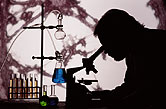
MONDAY, July 18 (HealthDay News) — Genetically engineered human cardiac stem cells helped repair damaged heart tissue in mice, according to a new study.
And, the researchers revealed, 10 weeks after the stem cells were implanted, tissue repair and function in these mice doubled that of control animals. They also noted the improvement lasted for at least 20 weeks.
“This study brings us one step closer to a clinical application for stem cell therapy,” the study’s lead author, Sadia Mohsin, post-doctoral research scholar at San Diego State University in California, said in a news release from the American Heart Association. “Since patients with heart failure are normally elderly, their cardiac stem cells aren’t very healthy. We were able to modify these stem cells, obtained from heart failure patients, to be healthier so that they could be transplanted into the heart and survive and thrive.”
Unlike other cells, stem cells can regenerate and have the potential to develop into multiple types of tissue. In conducting the study, the researchers used cardiac stem cells from patients receiving mechanical assist device pumps for failing hearts. The stem cells were genetically engineered to express a protein, known as Pim-1, which naturally occurs in response to heart damage.
The genetically engineered Pim-1 and non-modified human cardiac cells were implanted into the mice that had been induced to have a heart attack so researchers could compare the two groups.
Using molecular technology, the researchers also attached another fluorescent green protein derived from jellyfish so the Pim-1 was more easily identified.
The study authors concluded that the application could help in the advancement of stem cell therapy.
Commenting on the study, Dr Roger Hajjar, professor of medicine, cardiology, and professor of gene and cell medicine at Mount Sinai School of Medicine in New York City, said, “One of the main limitations of cell therapy for cardiovascular diseases has been the survival of cardiac progenitors cells implanted into the heart. In certain studies, more than 90 percent of these implanted cells die after injection into the diseased hearts, decreasing their ability to repair the hearts.”
In this new study, the researchers showed that by expressing the gene Pim1, the team was “able to enhance the reparative capacity of these cells. This is an important study addressing an unmet need in the field of stem cell therapy.”
While the study results are encouraging, experts note that research involving animals frequently doesn’t lead to medical advances that benefit people.
More information
The U.S. National Institutes of Health provides more information on stem cells.

